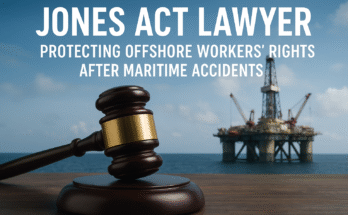Understanding the Jones Act
The Jones Act, formally known as the Merchant Marine Act of 1920, is one of the most important laws protecting seamen in the United States. It allows injured maritime workers to file lawsuits against their employers for negligence. A Jones Act lawyer specializes in helping offshore workers, seamen, and crew members secure fair compensation when their safety has been compromised.
Who Qualifies as a Seaman Under the Jones Act?
Not every maritime worker qualifies for protection under the Jones Act. A worker must:
- Spend at least 30% of their working hours on a vessel in navigation.
- Be directly contributing to the vessel’s mission or function.
- Be classified as a crew member or seaman rather than a longshore or harbor worker.
A Jones Act attorney can determine whether you qualify for benefits and legal protections under this law.
Common Offshore Accidents Covered by the Jones Act
A Jones Act claim may arise from a wide range of offshore accidents, including:
- Slip and fall accidents on wet or unsafe decks.
- Equipment failures due to poor maintenance.
- Fires, explosions, and chemical exposure on oil rigs or vessels.
- Injuries caused by untrained or negligent crew members.
- Unsafe working conditions due to lack of safety procedures.
Compensation Available Under the Jones Act
Seamen injured on the job may be entitled to significant financial recovery, such as:
- Lost Wages – Covering income lost during recovery.
- Medical Expenses – Including surgery, rehabilitation, and long-term care.
- Pain and Suffering – Compensation for physical and emotional distress.
- Future Earning Capacity – For workers permanently unable to return to offshore duties.
- Wrongful Death Claims – For families of seamen killed while performing their duties.
Why You Need a Jones Act Lawyer
Employers and insurance companies often fight hard to reduce or deny claims. A skilled Jones Act lawyer provides:
- Expert knowledge of maritime laws and regulations.
- Experience proving negligence in offshore accidents.
- Resources to investigate the accident thoroughly.
- Negotiation power to secure high-value settlements.
- Litigation skills for taking cases to trial when necessary.
The Legal Process for Jones Act Claims
- Initial Consultation – The lawyer evaluates your case and eligibility under the Jones Act.
- Case Investigation – Collecting accident reports, maintenance logs, and medical records.
- Filing the Claim – Preparing a lawsuit against the employer or responsible party.
- Settlement Negotiations – Attempting to resolve without trial for faster compensation.
- Trial – If necessary, pursuing maximum compensation through litigation.
High-Value Jones Act Settlements
Because maritime injuries often lead to lifelong disability, Jones Act settlements can be significant. Some examples include:
- $2.5 million for an injured deckhand in a crane collapse.
- $1.8 million for an offshore worker exposed to toxic chemicals.
- $3 million wrongful death settlement for a family of a seaman killed in a shipboard fire.
Frequently Asked Questions (FAQs)
How long do I have to file a Jones Act claim?
Generally, you have three years from the date of the injury, but acting quickly strengthens your case.
Do I need to prove negligence to win under the Jones Act?
Yes. Unlike workers’ compensation, the Jones Act requires proving that your employer’s negligence contributed to your injury.
Can my employer retaliate if I file a Jones Act claim?
No. Retaliation against employees for filing claims is illegal, and additional legal protections may apply.
Conclusion
Maritime work is dangerous, and when negligence causes injury, workers need strong legal representation. A Jones Act lawyer fights to protect the rights of injured seamen and their families, ensuring they receive full compensation under maritime law. If you’ve been hurt offshore, don’t delay—consult a Jones Act attorney today to secure your future.
Disclaimer: This article is for informational purposes only and does not constitute legal advice. Consult a licensed Jones Act lawyer for guidance specific to your case.



